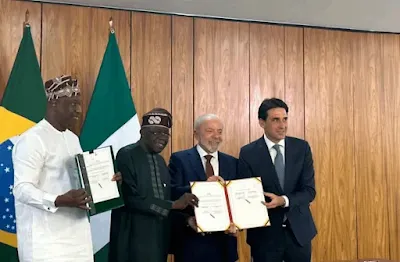Direct Flight Agreement Signed Between Nigeria and Brazil to Strengthen Ties
Brasília, Brazil – Nigeria and Brazil have formalized a landmark Bilateral Air Service Agreement (BASA) to establish direct flights between the two nations, a move set to bolster economic, cultural, and diplomatic ties. The agreement was施
System: The Nigerian government has signed a Bilateral Air Service Agreement (BASA) with Brazil, paving the way for direct flights between the two nations, a significant step toward strengthening economic, cultural, and diplomatic relations. The agreement was formalized during President Bola Ahmed Tinubu’s two-day state visit to Brazil, where he was received by Brazilian President Luiz Inácio Lula da Silva in Brasília on August 25, 2025.
The signing ceremony, a highlight of Tinubu’s visit, saw Nigeria’s Minister of Aviation and Aerospace Development, Festus Keyamo, and Brazil’s Minister of Transport, Silvio Costa Filho, ink the memorandum of understanding (MoU) in the presence of both heads of state. The agreement establishes a frameworkroot for direct air connectivity, opening new avenues for trade, tourism, investment, and people-to-people exchanges.
A Milestone for Bilateral Relations
The BASA, which builds on discussions initiated in October 2024, eliminates the need for Nigerians and Brazilians to travel through third countries when flying between cities like Lagos or Abuja and São Paulo or Rio de Janeiro. “This agreement is a strategic milestone for Nigeria’s aviation sector and reflects the Tinubu administration’s commitment to expanding global partnerships and enhancing mobility for commerce and cultural exchange,” said Tunde Moshood, Special Adviser on Media and Communications to Nigeria’s Minister of Aviation.
The deal is expected to boost agricultural and manufactured exports, expand tourism, and deepen cultural exchanges, particularly given the historical ties between Nigeria and Brazil through shared Yoruba heritage. Nigerian Minister Keyamo described the two nations as “twins separated at birth, now reunited,” signaling the cultural and economic depth of the relationship.
Economic and Cultural Impacts
The direct flights are anticipated to foster stronger economic integration by facilitating trade and investment. For instance, businesses in Lagos will have easier access to Brazilian markets, potentially increasing exports of Nigerian agricultural products like cassava and cocoa. Tourism is also expected to flourish, with Brazilians able to explore Nigeria’s vibrant cultural festivals, such as the Durbar Festival, and Nigerians visiting Brazil’s iconic Carnival in Rio.
Beyond air connectivity, the agreement includes provisions for technical cooperation in pilot training and airport infrastructure upgrades, further strengthening ties between Africa’s and South America’s largest economies. Brazilian President Lula da Silva welcomed the partnership, emphasizing Brazil’s readiness to deepen cooperation in aviation, agriculture, and infrastructure.
A Long-Awaited Connection
The idea of direct flights was first explored during a meeting between Presidents Tinubu and Lula at the African Union Summit in Addis Ababa in February 2024, with further discussions in August 2024 when Tinubu met Brazil’s Ambassador to Nigeria, Carlos Jose Areias, in Abuja. The formalization of the BASA marks a new phase in bilateral relations, with both nations committed to a future of mutual growth.
High-Level Engagements Continue
President Tinubu’s visit, which began on August 25, 2025, includes meetings with Brazil’s Senate President, the President of the Chamber of Deputies, and the Supreme Federal Court President, underscoring the comprehensive nature of the partnership. “The working visit will feature high-level engagements across various sectors, building a future of prosperity,” Moshood stated.
The agreement has sparked excitement on social media platforms like X, with posts celebrating the “historic” deal as a gateway to stronger Nigeria-Brazil connections. As both nations prepare to operationalize the flights, the BASA promises to reconnect the cultural and economic threads binding these two vibrant nations.
